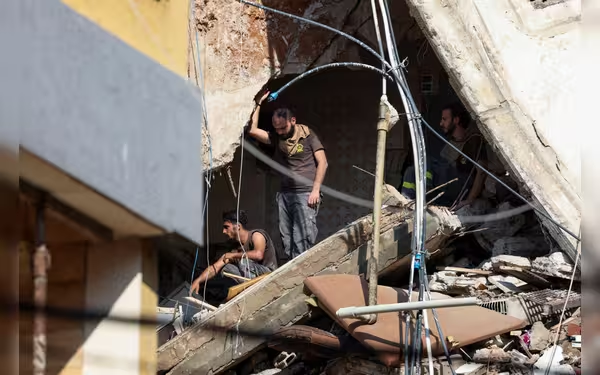Saturday, November 16, 2024 07:31 PM
Israeli Strikes in Lebanon Cause 558 Deaths, Urgent Global Response Needed
- Israeli airstrikes in Lebanon result in 558 deaths.
- UN faces pressure to address escalating crisis.
- Global leaders call for urgent ceasefire discussions.
 Image Credits: arabnewspk
Image Credits: arabnewspkIsraeli airstrikes in Lebanon have led to 558 deaths, prompting urgent calls for global intervention and ceasefire discussions.
In recent days, the situation in Lebanon has escalated dramatically, with reports indicating that Israeli airstrikes have resulted in a staggering death toll of 558 individuals, including 50 children. This alarming development has drawn the attention of global leaders and organizations, particularly the United Nations, which is now facing increasing pressure to address the crisis. The UN Secretary-General, Antonio Guterres, has expressed grave concerns, stating that Lebanon is on "the brink" of a larger conflict.
The backdrop of this crisis is the ongoing violence in the Middle East, which has intensified since the October 7 attack by Hamas on Israel. As the world watches, the UN General Assembly has become a focal point for discussions on how to manage the escalating tensions. Guterres has warned that the situation in Lebanon could transform into another Gaza, a territory already suffering from relentless violence and humanitarian crises.
As world leaders gather in New York for the UN's annual event, the urgency of the situation cannot be overstated. Lebanon's Prime Minister, Najib Mikati, is in attendance, following calls from France for an emergency meeting to address the crisis. Meanwhile, Iran's President, Masoud Pezeshkian, has condemned the UN's inaction, labeling it as "senseless and incomprehensible." The European Union's top diplomat, Josep Borrell, has also raised alarms, stating that the region is "almost in a full-fledged war."
The United States, a key ally of Israel, has cautioned against a full-scale ground invasion of Lebanon. A senior US official has promised to present "concrete" ideas for de-escalation during the UN meetings. However, the path to peace appears fraught with challenges, as efforts to broker a ceasefire in Gaza have so far yielded little success.
Israel's ambassador to the UN, Danny Danon, has criticized the UN's handling of the situation, accusing the assembly of hypocrisy. He pointed out that while the UN Secretary-General receives applause for discussing the suffering in Gaza, there is silence regarding the plight of Israeli hostages. This highlights the deep divisions within the international community regarding the ongoing conflict.
As the UN General Assembly progresses, leaders from various nations, including Turkiye, Jordan, Qatar, Iran, and Algeria, are expected to advocate for a ceasefire in Gaza. The discussions are crucial, as the world grapples with multiple crises, including the war in Ukraine and the ongoing humanitarian issues in the Middle East.
The situation in Lebanon is a stark reminder of the fragility of peace in the region. As global leaders convene to discuss these pressing issues, it is essential for them to prioritize dialogue and cooperation. The stakes are high, and the lives of countless individuals hang in the balance. The international community must come together to find solutions that not only address the immediate crisis but also pave the way for lasting peace and stability in the region.













